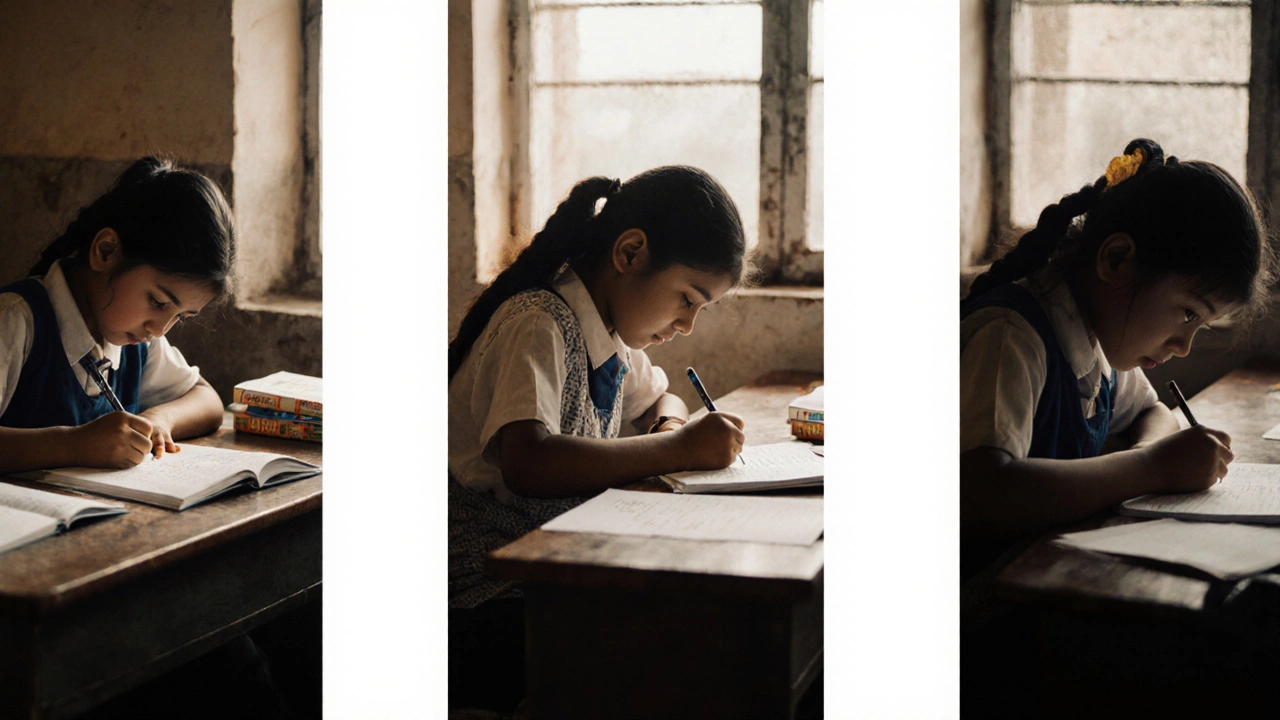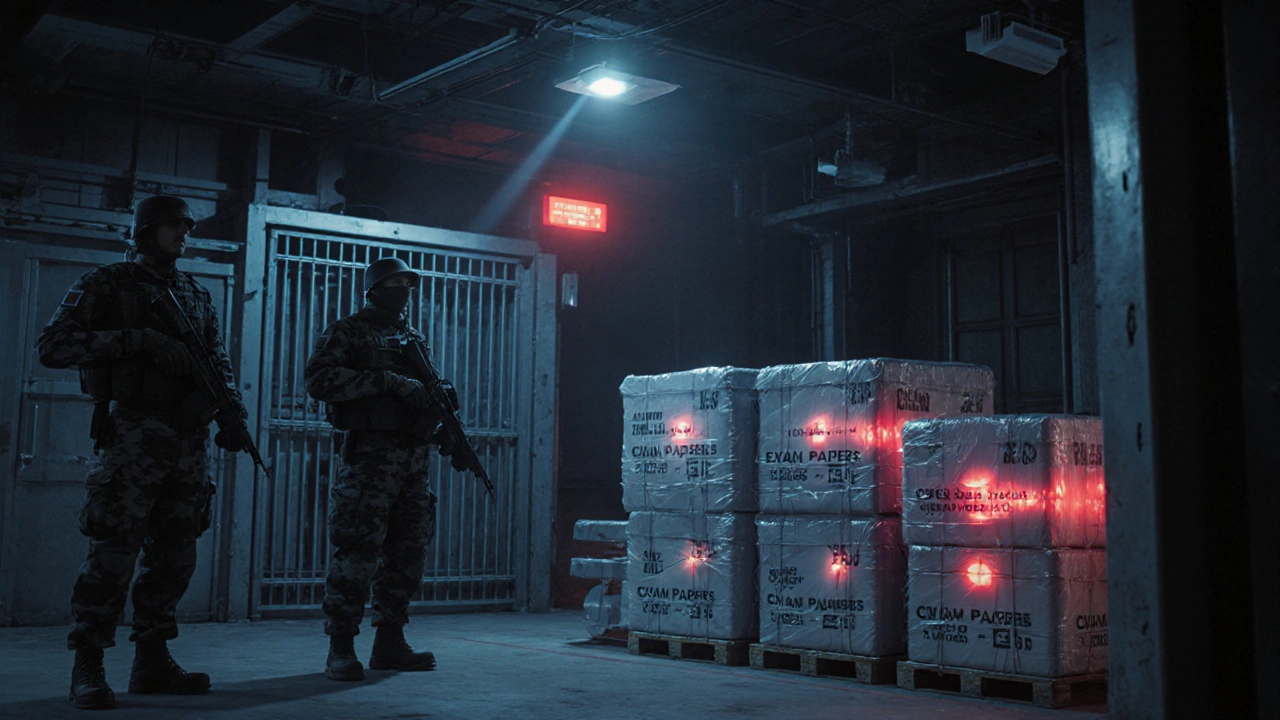CBSE Topic Weightage Calculator
Find Your Highest Impact Topics
CBSE exam questions are distributed based on topic weightage. This tool shows which topics give you the most value per hour of study.
Your Study Plan Impact
Every year, as CBSE board exams approach, parents and students in Delhi ask the same question: Is CBSE paper the same all over India? The answer isn’t a simple yes or no - but it’s far more important than most people realize. If you think the exam paper is identical for every student in every city, you’re not alone. But here’s what really happens behind the scenes.
How CBSE Designs Its Exams
CBSE - the Central Board of Secondary Education - doesn’t print one single paper and ship it to every school in India. Instead, it creates multiple sets of question papers for each subject. For Class 10 and Class 12, there are typically three versions: Set 1, Set 2, and Set 3. These sets have different question orders and slightly altered wording, but the difficulty level, marking scheme, and core concepts remain identical.
This isn’t random. It’s a deliberate security measure. If every student got the exact same paper, cheating would be easier. Imagine one student memorizing a paper from a friend in Mumbai and sharing it with someone in Lucknow. That’s why CBSE uses a system of paper sets rotated across regions. Each school receives only one set, randomly assigned.
Same Syllabus, Same Standards
While the papers differ in question order, the syllabus doesn’t. Every student in India - whether they’re in a village in Jharkhand or a metro in Bengaluru - studies the exact same CBSE curriculum. The NCERT textbooks are mandatory. The weightage of chapters is fixed: 20% for Algebra in Class 10 Maths, 15% for Genetics in Biology, and so on. Teachers across the country follow the same blueprint.
The marking scheme is also standardized. A 5-mark question in Physics will be graded the same way in Srinagar as it is in Chennai. Examiners are trained through centralized workshops. They use detailed answer keys with specific points that earn marks. No regional bias. No local interpretation. This uniformity is why CBSE scores are accepted by universities nationwide.
What Changes Between Regions?
Only one thing changes: the exam center. Students don’t travel to a central location. They take the exam in their own city, often in their own school. But the paper they get? It’s not the same as the one given to the school next door.
There’s no difference in language either. All CBSE papers are in English, with Hindi translations available for students who request them. The board doesn’t offer regional language versions. That’s intentional. CBSE aims to maintain a national standard, not a local one.

Why This System Works
This multi-set system has been in place for over a decade. It started after major exam leaks in the early 2010s. Since then, CBSE has tightened security. Papers are printed in secure facilities under armed guard. They’re transported in sealed containers with GPS trackers. Each set is distributed only hours before the exam.
Even the answer sheets are scanned and evaluated digitally. Examiners don’t know which region a paper came from. They see only a random code. This eliminates any chance of regional favoritism.
What Students Should Actually Worry About
Instead of wondering if their paper is harder than someone else’s, students should focus on what they can control: preparation. Since all sets cover the same syllabus and difficulty, practicing past papers from any set gives you the same advantage.
Look at the last five years of CBSE papers. You’ll notice patterns. Certain topics always appear: chemical bonding in Chemistry, quadratic equations in Maths, the Indian Constitution in Social Science. These are the high-yield areas. Master them, and you’re ready for any set.
CBSE doesn’t try to trick students. The questions are designed to test understanding, not memory. A student who truly grasps the concept of photosynthesis will answer any variation of the question. A student who memorized a textbook paragraph might struggle if the wording changes.
Myth Busting: Are Some Regions Easier?
You’ve probably heard someone say, “My cousin in Rajasthan got an easy paper.” Or, “The Delhi papers are always tougher.” These are myths. CBSE uses statistical moderation to ensure fairness. If one set turns out to be slightly harder, the board adjusts the passing marks slightly. It’s called equating.
For example, if Set 3 had more complex numerical problems, the passing threshold might drop by 1-2 marks. But the final grade - whether you got an A or a B - reflects your performance relative to the entire cohort, not your region.
There’s no advantage to being in a big city. A student in a remote Himalayan town has the same chance of scoring 95% as a student in Gurgaon - if they’ve studied the same way.

What Happens If You See a Paper Leak?
CBSE has a zero-tolerance policy. If a paper is leaked, the entire set is scrapped. The board immediately switches to an alternate set. In 2023, after a paper leak in Uttar Pradesh, CBSE canceled Set 2 for Maths and used Set 3 for all students in that region. No exceptions. No delays. The exam still happened on schedule.
This is why students are told not to share questions after the exam. Even mentioning a question online can trigger an investigation. CBSE monitors social media and messaging apps closely during exam season.
How This Affects Your Preparation
Here’s the bottom line: you don’t need to know which paper set you’ll get. You don’t need to hunt for “leaked papers” or try to guess patterns. All you need is a solid grasp of the NCERT syllabus.
Do this:
- Complete every chapter in your NCERT textbook. Don’t skip the examples.
- Solve at least five years of past papers - any set, any year.
- Focus on high-weightage topics. For Class 12 Physics, that’s Electromagnetic Induction and Optics. For Chemistry, it’s Coordination Compounds and Organic Reactions.
- Practice writing answers within time limits. CBSE gives 3 hours for 70-80 marks. Speed matters.
- Don’t memorize model answers. Understand the logic behind them.
CBSE isn’t about tricking you. It’s about testing your ability to apply knowledge. If you’ve studied properly, the paper you get won’t matter.
Final Thought: Uniformity Is the Point
CBSE was created to unify education across a vast, diverse country. It’s not perfect. But it’s designed to give every child - rich or poor, urban or rural - the same shot at success. The paper may not be identical, but the opportunity is.
So next time someone says, “My paper was harder,” ask them: Did you study the same way? Did you understand the concepts? That’s the real difference.
Are CBSE question papers the same for all students in India?
No, CBSE does not use the exact same paper for all students. Instead, it prepares multiple sets - usually three - for each subject. Each set has different question orders and phrasing, but the difficulty, syllabus coverage, and marking scheme are identical. This prevents cheating and ensures fairness across regions.
Do students in different states get different difficulty levels in CBSE exams?
No. All CBSE question sets are designed to have the same difficulty level. The board uses a process called equating to adjust grading slightly if one set proves harder than others. But the core content, concepts tested, and marking scheme remain consistent nationwide. A student in Kerala and a student in Punjab face the same academic expectations.
Is the CBSE syllabus different for different states?
No. CBSE follows a uniform syllabus across India. All schools affiliated with CBSE - whether in Ladakh or Tamil Nadu - use the same NCERT textbooks and follow the same chapter weightage. The board ensures that every student, regardless of location, learns the same material before taking the exam.
Can I prepare using past papers from a different region?
Yes, absolutely. Since all CBSE paper sets cover the same syllabus and difficulty, past papers from any region are equally useful for preparation. In fact, practicing papers from multiple years and sets helps you recognize patterns and common question types - which is more valuable than trying to guess which set you’ll get.
What happens if a CBSE paper gets leaked?
If a paper leak is confirmed, CBSE immediately cancels that set and switches to an alternate one. The exam is still conducted on the scheduled date. Students in affected regions receive the new paper. There are no delays or rescheduling. The board prioritizes fairness and security over convenience.
Do CBSE examiners know where the answer sheets are from?
No. Answer sheets are scanned and assigned random codes before evaluation. Examiners see only the code, not the school, city, or state. This ensures grading is unbiased and based purely on the quality of the answer, not the student’s location.

